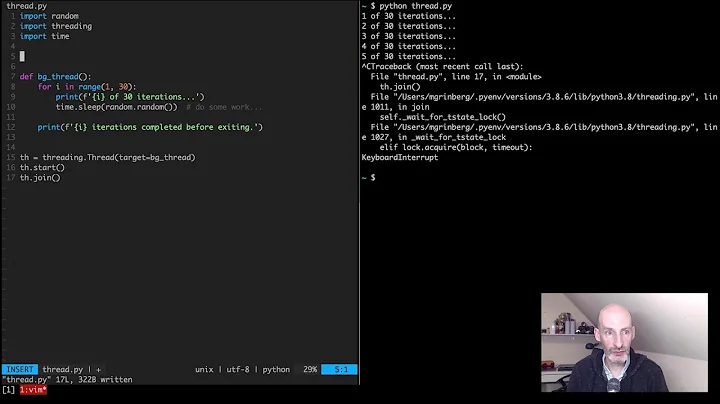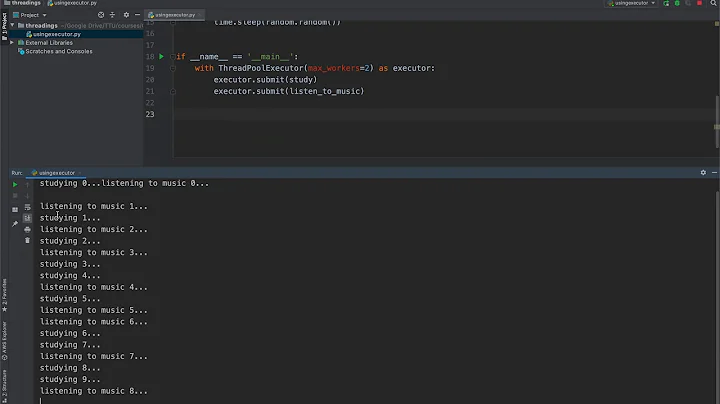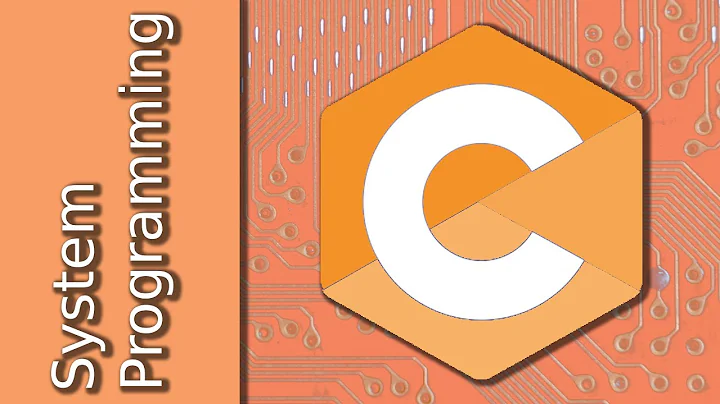Python thread pool that handles exceptions
Solution 1
I personally use concurrent.futures as the interface is very simple. For the traceback issue I found a workaround to preserve it. Checkout my answer to this other question:
Getting original line number for exception in concurrent.futures
Solution 2
If you want to get inforamtion about unhandled exception in threads and you use ThreadPoolExecutor, you can do like this:
import time
import traceback
from concurrent.futures import ThreadPoolExecutor
def worker():
a = 2 / 0
def worker_callbacks(f):
e = f.exception()
if e is None:
return
trace = []
tb = e.__traceback__
while tb is not None:
trace.append({
"filename": tb.tb_frame.f_code.co_filename,
"name": tb.tb_frame.f_code.co_name,
"lineno": tb.tb_lineno
})
tb = tb.tb_next
print(str({
'type': type(e).__name__,
'message': str(e),
'trace': trace
}))
executor = ThreadPoolExecutor(max_workers=1)
executor.submit(worker).add_done_callback(worker_callbacks)
Solution 3
Easy solution: use whatever alternative suits you best, and implement your own try-except block in your workers. Surround the root call if you must.
I wouldn't say these libraries handle exceptions "incorrectly". They have a default behavior, however primitive. You are expected to handle this yourself if defaults don't suit you.
Related videos on Youtube
xApple
Updated on December 25, 2021Comments
-
 xApple over 2 years
xApple over 2 yearsI've been looking around a good implementation of a simple python thread pool pattern and really can't find anything that suits my needs. I'm using python 2.7 and all the modules I have found either don't work, or don't handle exceptions in the workers properly. I was wondering if someone knew of a library that could offer the type of functionality I'm searching for. Help greatly appreciated.
Multiprocessing
My first attempt was with the built-in
multiprocessingmodule, but as this doesn't use threads but subprocesses instead we run into the problem that objects cannot be pickled. No go here.from multiprocessing import Pool class Sample(object): def compute_fib(self, n): phi = (1 + 5**0.5) / 2 self.fib = int(round((phi**n - (1-phi)**n) / 5**0.5)) samples = [Sample() for i in range(8)] pool = Pool(processes=8) for s in samples: pool.apply_async(s.compute_fib, [20]) pool.join() for s in samples: print s.fib # PicklingError: Can't pickle <type 'instancemethod'>: attribute lookup __builtin__.instancemethod failedFutures
So I see there is a back port of some of the cool concurrent features of python 3.2 here. This seems perfect and simple to use. The problem is that when you get an exception in one of the workers, you only get the type of the exception such as "ZeroDivisionError" but no traceback and thus no indication of which line caused the exception. Code becomes impossible to debug. No go.
from concurrent import futures class Sample(object): def compute_fib(self, n): phi = (1 + 5**0.5) / 2 1/0 self.fib = int(round((phi**n - (1-phi)**n) / 5**0.5)) samples = [Sample() for i in range(8)] pool = futures.ThreadPoolExecutor(max_workers=8) threads = [pool.submit(s.compute_fib, 20) for s in samples] futures.wait(threads, return_when=futures.FIRST_EXCEPTION) for t in threads: t.result() for s in samples: print s.fib # futures-2.1.3-py2.7.egg/concurrent/futures/_base.pyc in __get_result(self) # 354 def __get_result(self): # 355 if self._exception: #--> 356 raise self._exception # 357 else: # 358 return self._result # # ZeroDivisionError: integer division or modulo by zeroWorkerpool
I found an other implementation of this pattern here. This time when an exception occurs it is printed, but then my ipython interactive interpreter is left in a hanging state and needs to be killed from an other shell. No go.
import workerpool class Sample(object): def compute_fib(self, n): phi = (1 + 5**0.5) / 2 1/0 self.fib = int(round((phi**n - (1-phi)**n) / 5**0.5)) samples = [Sample() for i in range(8)] pool = workerpool.WorkerPool(size=8) for s in samples: pool.map(s.compute_fib, [20]) pool.wait() for s in samples: print s.fib # ZeroDivisionError: integer division or modulo by zero # ^C^C^C^C^C^C^C^C^D^D # $ kill 1783Threadpool
Yet an other implementation here. This time when an exception occurs, it is printed to the
stderrbut the script is not interrupted and instead continues executing, which defies the purpose of the exception and can make things unsafe. Still not usable.import threadpool class Sample(object): def compute_fib(self, n): phi = (1 + 5**0.5) / 2 1/0 self.fib = int(round((phi**n - (1-phi)**n) / 5**0.5)) samples = [Sample() for i in range(8)] pool = threadpool.ThreadPool(8) requests = [threadpool.makeRequests(s.compute_fib, [20]) for s in samples] requests = [y for x in requests for y in x] for r in requests: pool.putRequest(r) pool.wait() for s in samples: print s.fib # ZeroDivisionError: integer division or modulo by zero # ZeroDivisionError: integer division or modulo by zero # ZeroDivisionError: integer division or modulo by zero # ZeroDivisionError: integer division or modulo by zero # ZeroDivisionError: integer division or modulo by zero # ZeroDivisionError: integer division or modulo by zero # ZeroDivisionError: integer division or modulo by zero # ZeroDivisionError: integer division or modulo by zero #---> 17 for s in samples: print s.fib # #AttributeError: 'Sample' object has no attribute 'fib'- Update -
It appears that concerning the
futureslibrary, the behavior of python 3 is not the same as python 2.futures_exceptions.py:from concurrent.futures import ThreadPoolExecutor, as_completed def div_zero(x): return x / 0 with ThreadPoolExecutor(max_workers=4) as executor: futures = executor.map(div_zero, range(4)) for future in as_completed(futures): print(future)Python 2.7.6 output:
Traceback (most recent call last): File "...futures_exceptions.py", line 12, in <module> for future in as_completed(futures): File "...python2.7/site-packages/concurrent/futures/_base.py", line 198, in as_completed with _AcquireFutures(fs): File "...python2.7/site-packages/concurrent/futures/_base.py", line 147, in __init__ self.futures = sorted(futures, key=id) File "...python2.7/site-packages/concurrent/futures/_base.py", line 549, in map yield future.result() File "...python2.7/site-packages/concurrent/futures/_base.py", line 397, in result return self.__get_result() File "...python2.7/site-packages/concurrent/futures/_base.py", line 356, in __get_result raise self._exception ZeroDivisionError: integer division or modulo by zeroPython 3.3.2 output:
Traceback (most recent call last): File "...futures_exceptions.py", line 11, in <module> for future in as_completed(futures): File "...python3.3/concurrent/futures/_base.py", line 193, in as_completed with _AcquireFutures(fs): File "...python3.3/concurrent/futures/_base.py", line 142, in __init__ self.futures = sorted(futures, key=id) File "...python3.3/concurrent/futures/_base.py", line 546, in result_iterator yield future.result() File "...python3.3/concurrent/futures/_base.py", line 392, in result return self.__get_result() File "...python3.3/concurrent/futures/_base.py", line 351, in __get_result raise self._exception File "...python3.3/concurrent/futures/thread.py", line 54, in run result = self.fn(*self.args, **self.kwargs) File "...futures_exceptions.py", line 7, in div_zero return x / 0 ZeroDivisionError: division by zero-
habanoz over 10 yearsIt doesn't completely solve the problem but one trick I have often used in debugging these problems is temporarily replace the call to
pool.mapwith a call to the builtinmap.
-
-
 xApple about 11 yearsAdding a
xApple about 11 yearsAdding atry-execptblock cannot solve any of the problems. In the case ofconcurrent, I still can't get to the original traceback after catching the new exception. In the case ofworkerpool, I never get to the except block as the interpreter crashes before. In the case ofthreadpoolI never get to the except block as no exceptions are raised at all. -
slezica about 11 yearsYou're thinking of a
tryblock in the main thread or process. I'm saying you use atryblock around the function worker processes run. If you expect toraisean exception in a worker thread/process and have it sent to your main script, you need to first catch it where it occurred. -
 xApple about 11 yearsWell I'm not going to write error handling for every one of the functions I want to run. So what you are saying is that I should write my own global error handling. Yes, I could just chose one of the libraries and start editing the source code to add functionality, but that's what I wanted to avoid : )
xApple about 11 yearsWell I'm not going to write error handling for every one of the functions I want to run. So what you are saying is that I should write my own global error handling. Yes, I could just chose one of the libraries and start editing the source code to add functionality, but that's what I wanted to avoid : ) -
slezica about 11 yearsIt's Python: write a high-level error handler and decorate your functions with it -- or even better, subclass the
workerclass and implement yourtry-exceptthere. This is not editing source code, much less adding functionality. It's programming. You won't get a library that does this for you, because you are expected (and should be glad to) do it yourself. No offense intended, at all. -
 xApple about 11 yearsNo offense taken. I will probably write something myself. It's just that it appeared to me this something pretty basic, and am surprised it has not been done my someone else in the past. It didn't appear to me as a particular design that would require custom making. This is concurrency 101...
xApple about 11 yearsNo offense taken. I will probably write something myself. It's just that it appeared to me this something pretty basic, and am surprised it has not been done my someone else in the past. It didn't appear to me as a particular design that would require custom making. This is concurrency 101... -
slezica about 11 yearsI agree: it is pretty basic. However, it's also very difficult to come up with a default exception handling behavior that works all-around for everyone. Most people would end up overriding it anyway, so implementations leave it for users.
-
 Lorenzo Sciuto over 2 yearsthe problem is it gives back only the message of the exception and not the stacktrace
Lorenzo Sciuto over 2 yearsthe problem is it gives back only the message of the exception and not the stacktrace








![[Python Programing] - Lesson 5: Python Exceptions Handling](https://i.ytimg.com/vi/L-UB2pfDI8c/hq720.jpg?sqp=-oaymwEcCNAFEJQDSFXyq4qpAw4IARUAAIhCGAFwAcABBg==&rs=AOn4CLCAWZbvy8nPHO37b3GAyGPDmLaGQg)